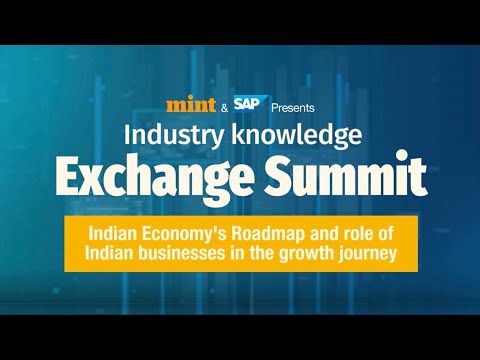Imagine a single, progressive platform that brings together the brightest minds across industries and backgrounds to discuss the infinite possibilities of tomorrow. This idea was brought to life with the inception of SAP Industry Knowledge Exchange.
Commenting on the initiative, Subramanian Ananthapadmanabhan, SVP, MidMarket, SAP APJ worded it best: “The systems of innovation, the people that matter, they’re not situated in just one organization. How can we get all of them together in a single room under the umbrella of an industry council to discuss, debate, analyze and come up with solutions for the problems we can’t see today, problems that could come a few years later? If we can have those answers, we can be ready to take on the future. That was the genesis of the SAP Industry Knowledge Exchange.”
When the most innovative minds across industries come together to discuss a brighter tomorrow, nothing is truly impossible. Understanding the need for such eye-opening conversations between our leaders, SAP Industry Knowledge Exchange (IKEX) serves as a powerful, collaborative platform that enables the exchange of knowledge and futuristic ideas.
The recent SAP IKEX Summit saw leaders and innovators from digital natives and unicorns, manufacturing, CPG and life sciences congregate to share, learn and grow. Much of these discussions were centered around India’s ‘Amrit Kaal’ and the collective efforts we can make to shape the India of tomorrow. Topics such as accelerated digitization across industries, the need for sustainable approaches, managing supply chain disruptions and adopting customer-centricity were highlights of the summit.
Let’s dive in and take a closer look at all the interesting details of this incredible summit.
The Age of Digitally Native Hypergrowth Unicorns
As we completely immerse ourselves into a new digital world, modern tech-savvy startups are promptly becoming enormously successful enterprises with their ability to identify and quickly act upon game-changing ideas. This capacity for constant innovation is helping startups create massive opportunities and disruptions in the industry. Fitting to the status quo, the first topic of discussion was on unlocking the secrets of building a unicorn startup.
What does it take to build a unicorn? While many answers came to the fore, the panel agreed that if it’s a big problem and one can solve it in a way that has not been done by anyone else, you have the genesis of building a great company. Everything is about solving a significant enough problem.
The summit offered a detailed look into the necessity of exceptional digital experiences for modern-day customers. Similarly, the different roles required for a startup to prosper were also widely talked about, with special emphasis being placed on the roles of CFOs. For a startup to truly become a unicorn, a resilient and agile company culture is highly imperative. Kislaya Srinvastava, CFO, Bookmyshow discussed the current working environment of CFOs and said, “It has been a transformation journey for me personally and from a CFO role standpoint. I think it is a very challenging, yet exciting, time for professionals like us where we learn things we had never heard about, especially technology and new concepts. The expectations of the CFO is that you keep changing, keep learning, keep growing and keep contributing. It is a journey and you need to be a part of the journey. ”
Throughout the discussions, it was made clear that technology plays an immense role in driving the success of modern startups. Saunak Ghosh, CMO of Turtlemint, used the example of his own enterprise to explain it best: “We have an app that has a bunch of content that allows the agents to interact with end customers. We have a learning and development platform as well. We realized it is a finite segment, as players in the ecosystem we also have to grow the ecosystem. We have to empower guys who are coming in now.”
For startups to make it big, fundraising by successfully pitching ideas to investors is immensely important. Sharing his experience on this topic, Karan Mehta, Founder & CTO, Kissht and Ring, said, “One of the things that has always stood out is that the biggest key of fundraising is to be extremely social. You have to be very good at networking. You have to be someone that talks to people, listens to ideas, shares ideas. As founders, all you can do is identify a problem and then truly solve that problem. The fundraising part will automatically follow very naturally. ”
Key Takeaways
- Sumeet Mehta, Co-Founder & CEO of Lead School, discussed the ability to find simple solutions for complex problems by giving an example of his disruptive edtech solution.
- Naiyya Saggi, Co-Founder of Good Glamm Group, explained the necessity of communicating a strong value proposition through a digital ecosystem.
- The critical necessity of a robust and scalable technological platform to engage customers and generate leads was highlighted by Pankaj Bansal, Chief Business Officer of BankBazaar.
- Suraj Shetty, Head Of Customer Experience, Kissht, emphasized on the necessity of adopting modern technological tools to empower employees.
- The roles and duties of the modern CFO were extensively discussed with industry leaders all agreeing that CFOs must play a pivotal role in the success of digital natives.
- The final discussion was centered around the critical necessity of a winning company culture to drive the success of startups. Sheetal Bhanot, CHRO of Inframarket, talked about the infinite potential that startups can reach by just embracing the right vision.
Click here to view some of the highlights
Driving Growth in CPG and Retail
The CPG and retail industry has been constantly evolving after the COVID-19 pandemic as global trends in customer behavior radically shift. This has opened the doors to a highly customer-centric approach for businesses looking to nurture a loyal following in the face of uncertainty. The future of CPG revolves around a number of prominent topics. The objective here was to talk about the future of the retail industry. So panelists, speakers, and delegates went through a host of topics relevant to our future. For example, they identified the modernization of routes to market in a true omnichannel world, how to enhance resilience and agility of the supply chain given the uncertainty of the overall geopolitical situation, and the uncertainty of demand as critical points.
Our panel of industry experts started the discussions by explaining how brands can drive customer loyalty in an omnichannel world. This conversation revolved around how customer centricity should involve personalized experiences across various touchpoints. Similarly, by embracing modern innovations and platforms such as the Metaverse, CPG can reinvent itself as an even bigger industry in India’s Amrit Kaal.
Dr. Kamal Karnatak, Group CIO, RJ Corp, discussed what the new normal looks like in the CPG space after the COVID-19 pandemic. Giving his own experience as an example, Dr. Karnatak said, “Pre-pandemic, we were doing 30-40% deliveries in Pizza Hut, now it is 60-70% even after the lockdown opened. So, a lot of demand planning exercise needs to be done for delivery. When we were designing our pre-pandemic supply chain, we thought there had to be a centralized supply chain. But during the pandemic, we realized that a centralized model would not work. So you need to resort to this centralized plus decentralized model.”
From the panel discussions, we can understand that the pandemic has drastically changed the CPG landscape. Organizations have had to reinvent themselves and their supply chains in order to survive in the industry. On this topic, Vijay Kannan, CDIO of Godrej, gave us a look into the volatile new relationship between resilience, agility, and cost in our post-pandemic environment: “If you look traditionally at the last 15–20 years, you have been trained to optimize for cost. I think what COVID-19 has taught us is that resilience and agility trump cost. Now, how you find the right balance between resilience, agility, and cost has become an even more complex optimization decision. How do you use the vast amounts of usable data that we can now collect, be it from our own internal operations or from the broader ecosystem? How do you put the data to best use to get to more optimal decisions between cost, agility, and resilience? This is what organizations are grappling with.”
The discussions then shifted to the necessity of responsible and sustainable practices across the supply chain in the CPG industry. In an age of conscious consumerism, green practices and sustainable approaches are crucial for progress. Srinidhi Rao, Head of Sustainability and ESG at Waycool, gave us an example of his own enterprise’s green efforts: “For us, being in the food supply chain space, decarbonization opportunities happen to be in different phases of this value chain, right from the food production to the supply chain, the operation as well as the distribution. Most of our climate smart interventions deliver both carbon mitigation and carbon removal in each of these phases. For example, the root optimization and strategic sourcing points, if I just take the case of onions and tomatoes, in the last 6 months because of this intervention we avoided about 4.500 tonnes of wastage which otherwise would have happened.”
Key Takeaways
- Industry leaders emphasized on the extreme importance of improving customer services to progress in the CPG space.
- Forecasting has become increasingly difficult in the post-pandemic era without adequate data.
- The experts acknowledged a prominent shift in consumer behavior with customers now demanding ideal experiences across the board.
- The industry experts agreed that some of the most notable challenges in the modern CPG industry include volatile customer demands, increase in competition and a decrease of revenue.
- Innovative technologies such as cloud, data-driven insights and AI are playing a significant role in reshaping the CPG market by promoting sustainability and increasing efficiency.
Click here to view some of the highlights
Reshaping the World of Manufacturing and Supply Chains
The quest of becoming the world’s largest manufacturing hub has led to monumental reforms in India’s enterprises. With hopes of attracting foreign investments and gaining a significant share of the global supply chain, our government has been pushing incentives like PLI whilst facilitating the process of conducting business. Becoming a global auto and manufacturing hub was extensively discussed in the recent Industry Knowledge Exchange Summit.
When discussing how supply chain planning has evolved over time, Mukesh Kumar, Head of Industry and Customer Advisory, SAP said it best: “Considering everything, supply chain planning is now an enterprise-wide function, working towards servicing the customer rather than a very departmental, siloed thing we had earlier. Secondly, decisions are now made in real-time, much faster using the data that we have. Essentially, we listen, we engage, and we react much faster. Beyond cost and responsiveness, we are also focusing a lot on sustainability. Obviously, technology is still the backbone and it is constantly accelerating. ”
As the discussion revolved around the most pertinent disruptions currently plaguing the industry, Pidilite Industries’ Pankaj Bhargava gave us his expert opinions: “If we look at the disruptions, we can classify them into three types – the whole demand side, the supply side and the supply ecosystem. If we look at the demand side, we saw a complete destruction of demand during the pandemic, everything closed down. Then there was a massive bounce back of demand and the volatility remained. On the supply side, people struggled to adapt to this volatility, the suppliers were affected by availability issues. Thirdly, the supply ecosystem could not gear towards the volatility that we had seen. Ultimately, if we look at the impact, there was volatility in demand, uncertainty in supply and the supply ecosystem could not manage.”
Concepts about the digital factories of the future were also heavily talked out during the SAP Industry Knowledge Exchange Summit. Immersive technologies such as XR are being leveraged to redefine the way enterprises design, build and sell their products. According to Navin Nathani, Head IT & Transformation at Hindalco Industries, “Digitization has always been a very critical enabler for all manufacturing organizations. I think the resiliency of the supply chain has improved drastically over the last couple of years and organizations have started taking a lot of digitization activities in order to activate the pent-up demand that was there.”
Topics such as managing supply chain disruptions through synchronized processes and the impact of the National Logistics Policy were also major parts of the SAP Industry Knowledge Exchange Summit.
Key Takeaways
- Som Kapoor, Partner – Automotive, EY, expertly explained the intricacies of India’s automobile industry, highlighting that the manufacturing ecosystem is currently undergoing a monumental transformation. This session encompassed ideas of sustainability, growth, innovation and progress.
- Hemanth Satyanarayana, CEO of Imaginate, discussed the factories of the future by diving into the relevance of modern innovations such as AR/VR technologies and the Metaverse.
- Discussions on supply chain disruptions were a major part of the summit with industry experts highlighting relevant challenges in modern supply chains. The experts agreed that Industry 4.0 and digital technologies must be embraced to tackle obstacles.
- Accenture’s Kiran Kumar Gangapur thoroughly discussed India’s National Logistics Policy and the implications it has on the manufacturing industry of India.
- The industry experts had a detailed conversation on the role of technology in creating a sustainable, efficient and agile future for manufacturing. They all agreed that the adoption of modern technologies is an imperative for success.
Click here to view some of the highlights
Ushering in the Future of Life Sciences
Hailed as the “pharmacy of the world”, India ranks third for pharmaceutical export by volume and sends medicine to over 200 countries. But this prestigious title does not just refer to the volume of export, it also refers to the innovative technologies, methods and practices that are part of the Indian life sciences industry. The pharma and life sciences sector of India continues to grow with smart solutions and services based on digital technologies.
Whilst discussing the need for quality of product in the life sciences industry, Ranjana Pathak, Global Quality, Medical Affairs and Pharmacovigilance at Dr. Reddy’s Laboratories set the tone: “In my opinion quality and innovation are not divergent. They are convergent and if they are not going to converge, then we are probably going to be obsolete. Reason I say that is because good quality is not expensive. There are fertile grounds in laboratories and manufacturing for errors to happen because humans make mistakes, but if we innovate in those two areas particularly, the quality of the product, the process and the system will significantly shoot up.”
Following up, the panel talked about delivering exceptional outcomes to patients. Ganesh Ramachandran, Global CIO, Alkem Laboratories explained it best: “The holy grail for pharma has always been, what is the outcome you deliver for the patient, that’s the final outcome you look at while giving a drug to a patient. Getting an outcome where you’re improving the outcome for a patient is the biggest one that all the stakeholders are keen to see if the HR is able to drive the following.”
In the recent SAP Industry Knowledge Exchange Summit, India’s current pharma industry was extensively discussed with strategies, plans and ideas of growing through quality and innovation. This includes the steps to quality control, maintaining global standards, creating effective track and trace mechanisms and other notable trends. Accelerated digitization in the life sciences space was also a prominent topic of discussion with decentralized patient data recording, AI and e-HR being the focal points. The future of life sciences in India is being driven by a highly patient-centric approach for distributed clinical trials that creates a vibrant research ecosystem in our country.
The creation of a connected environment in the life sciences industry promises to usher in a new age of progress. Commenting on this tech-driven environment, Jayant Dwivedy, Executive Director of USV, said, “We can proudly say that the pharmaceutical industry is fully virtually paperless end-to-end. This is where everything comes together, in terms of the manufacturing execution system, warehouse management system, the storage retrieval system, the centralized data admission system, the QMS (Quality management system), all working in an integrated fashion.”
Key Takeaways
- Dr. Reddy’s Laboratories’ Dr. Ranjana Pathak and Indian Pharmaceutical Alliance’s Dr. Rajiv Desai had an eye-opening discussion on the necessity of building patient-centric Distributed Clinical Trials (DCTs) and a resilient research ecosystem in India.
- The latest technologies in the life sciences space were widely discussed by our industry experts. All the experts agreed that modern innovations play a significant role in reducing delivery time, decreasing cost, and increasing convenience.
- A detailed stakeholder analysis was conducted for the 3Ps of customer experience in pharma – Patients, Physicians and Pharmacies.
Click here to view some of the highlights
Building Tomorrow Together

While, SAP Industry Knowledge Exchange is a collaborative platform designed to enable the exchange of knowledge and deep dive into industry-specific ideas and initiatives, the summit served as an incredible platform for open discussion for the most influential leaders, innovators and decision-makers across our industries. With a plethora of vibrant ideas, experiences, strategies and industry standards being shared amongst members, this summit helped us create essential industry networks to build the India of tomorrow. By nurturing collaboration across enterprises and industries, we can usher in a new age of progress, growth and harmony in our country.
Joining hands for this initiative alongside SAP and Mint were also organizations such as Amazon Web Services, Tech Mahindra, CII, Team Viewer, DXC Technology and the Indian Pharmaceutical Alliance.
To learn more about the initiative and to become a member of the thought leadership community, visit the official website at SAP Industry Knowledge Exchange and play a role in building India, growing your network and being an agent of technological transformation! By becoming a member of the SAP Industry Knowledge Exchange, you can get access to insights, resources, events, interact and network with thought leaders, and industry veterans.
This article was originally published on https://www.livemint.com.



